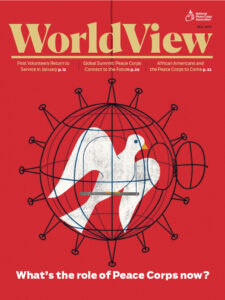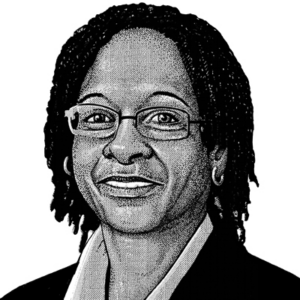Darlene Grant on her task to help shape “a more just and equitable Peace Corps”
Illustration by Edward Rooks
At a time of national reckoning with racial injustice — and the Peace Corps has heard calls from Volunteers to do better in confronting systemic racism as it affects the agency — a new top level advisor has come on board to lead work to create “a more just and equitable Peace Corps.” Darlene Grant’s official title is senior advisor to Director Jody Olsen. The excerpted Q&A below gives a sense of the scope of her work. You can read the full version on the Peace Corps website.
Some background on Dr. Grant: 18 years as a professor of social work at the University of Texas at Austin, teaching graduate and undergraduate courses in social justice, clinical practice, research methodology, and working with at-risk youth. Named 2006 Social Worker of the Year by the National Association of Social Workers. Took a leave of absence to serve in Cambodia’s third Peace Corps Volunteer cohort as a teacher and teacher trainer. Then country director in Mongolia and Kosovo.
On volunteering in Cambodia
It challenged everything I had learned from living life as an African American woman whose parents were a part of the great migration of the 1950s — when they traveled from the South to northern cities for opportunities. It challenged everything from my academic pursuits to what I taught as a professor about empathy, resilience, social justice, diversity, power, privilege, and oppression.
It challenged everything from my academic pursuits to what I taught as a professor about empathy, resilience, social justice, diversity, power, privilege, and oppression.
The people-to-people work of a Peace Corps Volunteer — living at the level of the community in which you serve, building relationships in the face of daily cross-cultural misunderstanding (that, in my case, included helping others overcome stereotypes related to the package that I come in) affirmed my commitment to my profession as it intersects with the mission of the Peace Corps. It solidified my passion for this work.
As a country director
It is from my own personal experience as a Volunteer and my professional framework that I have encouraged Volunteers — when they feel their work or presence is not valued — to get back to their why. Why do you want to do meaningful work? Why did you join the Peace Corps? It is my firm belief that if you can get back to your why, and if you use the staff and peer resources around you, you will tap into your core resilience.
As senior advisor
My primary role is to listen to and advise through the filter of my experience as a clinical social work practitioner; professor-researcher focused on anti-violence, anti-poverty, anti-racism, and oppression; Returned Peace Corps Volunteer; and former country director. I want to create a space where I can truly listen to people’s stories and recommendations on behalf of the agency. I aim to collaborate with the Peace Corps’ Task Force on Diversity and Inclusion to connect the dots in terms of attitudes, policies, and practices that deliberately or inadvertently put up barriers toward attaining the richest possible diversity of applicants, Volunteers, and staff from underrepresented groups.
Why do this?
My unique skills make me sensitive to the desire everyone has to be seen, heard, and respected for who they are, their fears, what they have overcome, and their hopes and dreams. Peace Corps changed the trajectory of my life and career to be one focused on meaningful cross-cultural work which, through an agency embedded within our U.S. government, enables me (and us) to work for a better America and a better world. After hearing the sad news of the passing of Representative John Lewis, I have been framing the dozens of calls for Peace Corps leadership to address organizational racial inequities in terms of his life, his fearless commitment, and his devotion to this work. The challenges and importance of anti-oppression, anti-racism, cannot be overstated.
Peace Corps changed the trajectory of my life and career to be one focused on meaningful cross-cultural work which, through an agency embedded within our U.S. government, enables me (and us) to work for a better America and a better world.
As I emphasize the importance of pressing on, no matter how tired, no matter how skeptical that this effort will lead to real change, one quote by Rep. John Lewis particularly resonates: “Freedom is not a state; it is an act. It is not some enchanted garden perched high on a distant plateau where we can finally sit down and rest. Freedom is the continuous action we all must take, and each generation must do its part to create an even fairer, more just society.”
As everyone who reads this response has undoubtedly done, I have ruminated on the meaning of the intersection of the pandemic, the evacuation, and the horrendous killings of Tamir Rice, Breonna Taylor, George Floyd, and too many others. These events have catapulted our society — and this agency — to a tipping point with a feeling of real possibilities for change.
 This story was first published in WorldView magazine’s Fall 2020 issue. Read the entire magazine for free now in the WorldView app. Here’s how:
This story was first published in WorldView magazine’s Fall 2020 issue. Read the entire magazine for free now in the WorldView app. Here’s how:
STEP 1 – Create an account: Click here and create a login name and password. Use the code DIGITAL2020 to get it free.
STEP 2 – Get the app: For viewing the magazine on a phone or tablet, go to the App Store/Google Play and search for “WorldView magazine” and download the app. Or view the magazine on a laptop/desktop here.
